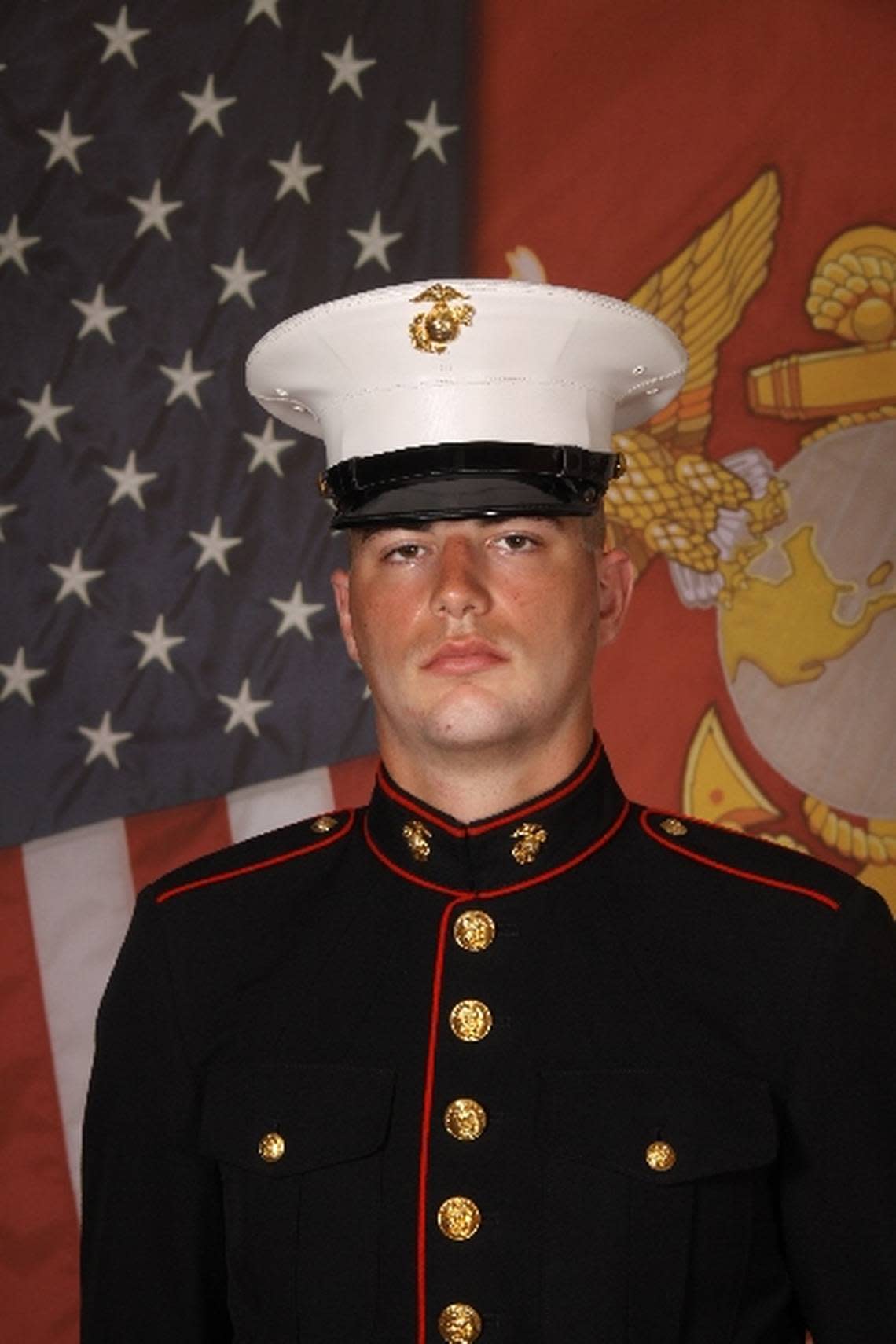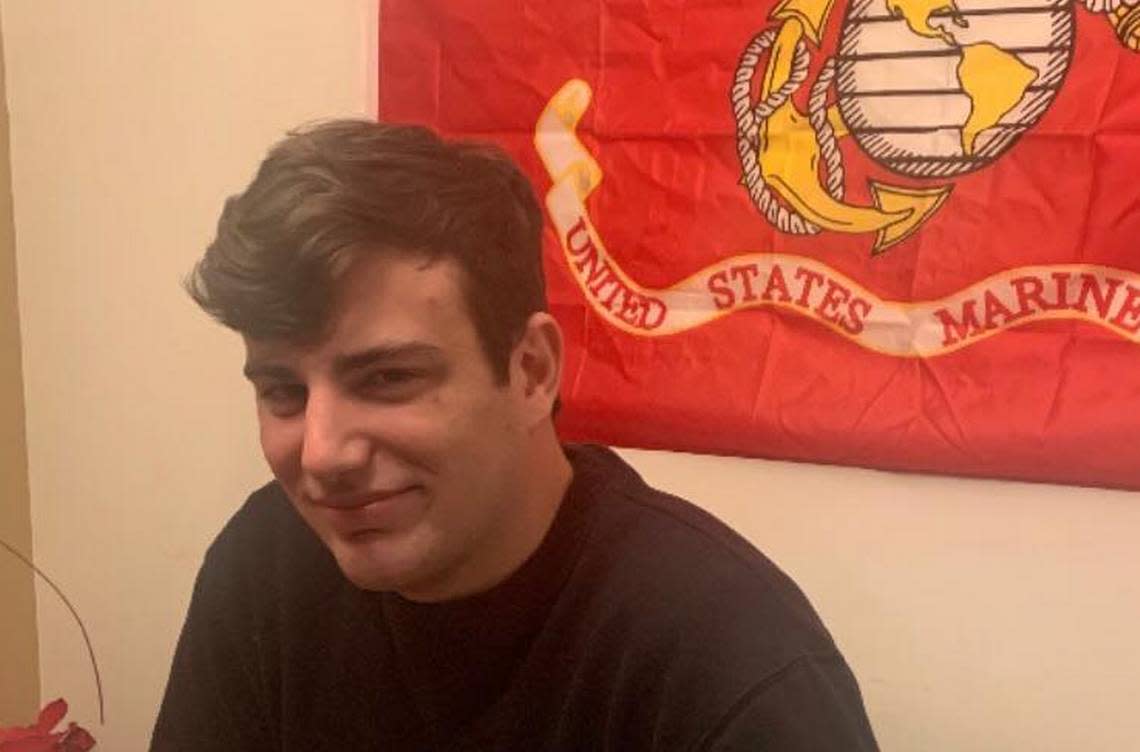Marine recruit died in Parris Island’s final, most challenging test. How did it happen?
Second of three parts
Dalton Beals wasn’t just fighting to complete the two-day Crucible training at the U.S. Marine Corps Recruit Depot Parris Island. The recruit, who joined the Marines because it was the toughest military branch, was fighting for his life.
He was beginning to slump, teetering at times, and he was breathing heavier than most of the others.
It was over 90 degrees. Another recruit offered to pour water on him. Beals responded: “It wouldn’t help.”
Recruits kept telling Beals they were “almost done,” and provided other encouragement.
Described by his cohorts as a “powerhouse,” a “big, strong kid” who was a “really good recruit,” Beals didn’t get the medical attention he needed on June 4, 2021, and died, alone, of hyperthermia, after walking away from his team. His whereabouts were unknown by his fellow recruits and team leader for more than an hour before his body was discovered.
He was 19.
In the months that followed his death, Beals’ friends and family back in Pennsville, New Jersey, have had little information as to what happened during the Crucible — the 54-hour final challenge of recruit training involving physical, mental and moral tests.

“It was pretty devastating for a lot of people of this town,” Beals’ former high school football coach, Mike Healy, previously told the Island Packet and Beaufort Gazette.
In December, Jay Manorowitz, the father of one of Beals’ closest schoolmates and another former coach, told a reporter he could not sleep and wanted answers. To him, Beals was a “goofy goober” who was “always smiling.”
“(If) he made a mistake, he would smile,” Manorowitz said. “(He was) one of the hardest-working kids I’ve ever coached.”
A report on a Marine investigation into the final hours of Beals’ death provides painful answers. The key finding: Leadership failures up and down the chain of command contributed to his death.
Military prosecutors are now considering legal or administrative punishment for three marines, two commanders and the senior drill instructor who served as Beals’ team leader during the Crucible, according to the report.
“Had it been an accident,” says Stacie Beveridge Beals, Beals’ mother, “It would be easier to accept.”
Here are details of what happened from the report:
Concerned about the heat
Going into the Crucible in June 2021, Marines were concerned about the heat.
First, there had been a recent change that placed the Crucible seven days after Basic Warrior Training, which involves war-fighting, both day and night. Two recruits suffered heat injuries during the BWT. And in the seven days between the BWT and the Crucible, the recruits had to complete a combat endurance course and physical fitness test.
And in the weeks prior to the Crucible, temperatures had been mild, and there was concern whether the recruits would be acclimated to the heat.
The Crucible begins
The first day of the two-day Crucible began around 2 a.m. on June 3, a Thursday, with Company E’s recruits broken into two groups then divided into 17 teams, each led by a drill instructor. Beals was in Group 2, Team 1.
The first day was described as ordinary. On Day 2, the heat started to get to some of the recruits.
The second day’s first event lasted four hours, including two hours of body sparring with pugil sticks and two hours in which recruits tackle 12 problems that provide mental, teamwork and leadership challenges.
At 10:30 a.m., the teams moved on to the second event. Recruits, wearing their Kevlar helmets, black leather gloves, and hiking on blacktop exposed to the sun, were charged with a 4-mile march to the Khe Sanh Range where they experienced live fire before moving back to Page Field.

During the hike to the range, recruits reported, it began to get warm. Black flag conditions —90 degrees or warmer — kicked in at 10:45 a.m.
Beals seemed OK on the hike out. One recruit recalled hearing Beals telling someone he was from New Jersey.
When they arrived at the training site and received instruction, one recruit told investigators that they were “cooking in the sun.” Then they went on patrol through the trees and conducted “contact drills,” which resulted in the patrol taking longer than usual. Once the firing portion of the training was done, the recruits returned to the staging area to clean rifles and drink water and Gatorade — in the sun.
On the hike back, recruits complained about the heat and “would go to the head to get shade.” One recruit had been bitten by fire ants and was told to see the corpsman. When he returned, he was asked by the senior drill instructor, sarcastically, “Are we dying?” One Marine told investigators that the exchange discouraged recruits from asking to see the corpsman.
By 3:09 p.m., the hike had finished and recruits were told to get water and remove blouses and helmets. Meanwhile, Beals was disorientated, sluggish and “leaning over like he was falling asleep.” Recruits told him to drink water, the report says, but he refused. Beals gave one recruit canteens to fill, but they were full.
As they waited, recruits passed around a squirt bottle. Beals was hunched over and refusing to sit down. Everyone, one recruit said, knew “Beals was out of it.”
Beals looked like he was going to fall over but responded “yes sir” when he was asked whether he was OK, saying he was just tired. “Very well,” the superior responded, “carry on.”
Ten minutes later, someone yelled, “Recruit down,” after a recruit, who was in a different team, succumbed to the heat and was hallucinating. The recruit had to be held down by four dill instructors in order to take their temperature, which was 107. A temperature over 105 requires immediate medical attention. It was 3:51 p.m. The recruit was placed in a polar bag and cooled down and taken to the hospital.
One recruit asked the squad leader whether it was Beals who was being treated. The rest of the team, it turned out, had assumed that it was Beals when they heard, “Recruit down.”
The squad leader said, “don’t worry about that,” and “get out of my face.”
In the meantime, a second recruit — also not Beals — went down with heat illness.
The next event, which involved bridges and “ammo cans,” started. “What about Beals?” somebody asked. He was missing.
A search began
A person who is not identified in the report left in a safety vehicle, then ran through the previous course and met up with a corpsman. While walking through the training area, she spotted Beals collapsed by a downed tree.
Beals, the youngest of three, was known for being a “gentle giant” in his New Jersey hometown. He was described by his mother, Stacie Beveridge Beals, as someone who “was never in trouble” but even if he was “you couldn’t yell at him.” He was a stellar athlete and participated both on his high school wrestling and football teams. He loved practical jokes, the sitcom “Friends” and listening to stories from his teachers and coaches.
“He wasn’t a typical young boy,” Beveridge Beals said. “He liked talking to older people and was interested in their lives as well. He bonded with parents where other kids wouldn’t bother.”
Beals, it turned out, had gone to get water by himself, looking wobbly, drained and disoriented. When he set out alone, the recruits told investigators, Beals did not want a buddy, which was a system that was stressed during training.
When help reached Beals, he did not have a pulse. Marines tried to resuscitate him. He was pronounced dead at 5:41 p.m. He had been dead for more than an hour.
